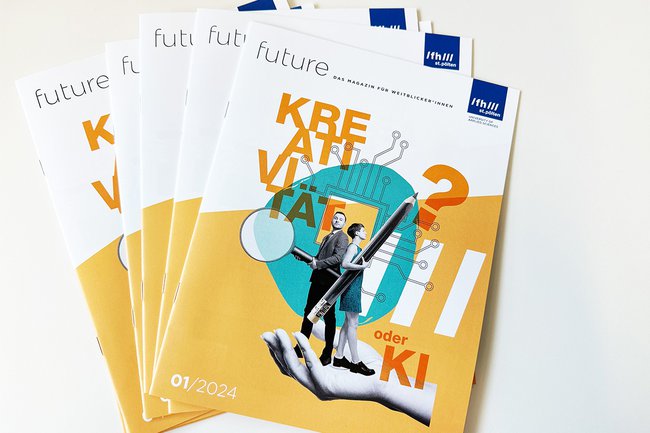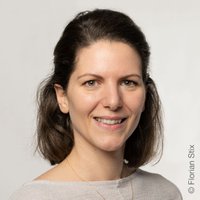Creativity or AI?
The latest issue of the UAS magazine future reveals how artificial intelligence is helping us move forward

How creative is AI really? How do we feel about it? What ethical questions does it raise? – The St. Pölten University of Applied Sciences addresses these questions in the 18th issue of its future magazine. In exciting articles and interviews, the magazine sheds light on the many possible applications of artificial intelligence, its impact on our society, and the challenges it poses.
Issue #18 UAS magazine future
In art and media, in higher education, and – last but not least – in fake news: AI is on the rise everywhere. Since the emergence of ChatGPT, even more so than before, AI has also changed the private lives of many people.
“In the 18th edition of our ‘future’ magazine, we focus on the highly topical subject of artificial intelligence. We take a look at possible areas of application for AI, consider ethical dilemmas, and examine how AI is changing university teaching. The emphasis is not only on technical aspects, but also on the social implications,” say Johann Haag and Hannes Raffaseder, Executive Directors of the St. Pölten UAS.
More Creative with AI
The magazine's dossier looks at the latest questions pertaining to artificial intelligence. Can AI really be creative? How does it challenge us ethically and morally, and should we impose legal barriers on it? How do universities deal with technological change? What opportunities and risks does AI offer for inclusion and gender diversity, and how is it currently being used in the arts?
From Clay as a Sustainable Building Material to Digitalised Cultural Heritage
The latest magazine covers several other topics as well: It reports on how clay can be used as a sustainable building material for noise barriers in railway construction, and on the research currently conducted by the new Josef Ressel Centre for Knowledge-Based Visual Data Analysis in Industrial Production. Readers can also find out how a part-time UAS lecturer helps students to translate PR concepts from the lecture hall into practice. Furthermore, PhD students report on how they are linking cultural heritage with digital technologies in their dissertations as part of the ‘Visual Heritage’ PhD programme jointly run by TU Wien and the St. Pölten UAS. Students also talk about how they developed a talent portal as part of a E3UDRES2 hackathon which aims to close the gap between education and the labour market.
Artificial Intelligence at the St. Pölten UAS
Several degree programmes at the St. Pölten UAS are dedicated to aspects of artificial intelligence and train specialists with the relevant expertise – including the bachelor degree programme Data Science & Business Analytics and the master degree programme Data Intelligence. Solutions for and approaches to the use and further development of artificial intelligence are being developed in numerous scientific projects at the UAS’ research institutes and a ‘Center for Artificial Intelligence’ that they operate jointly.
Read future #18 as an online magazine
Read future #18 here.
Don't want to miss another issue?
You can subscribe to the online future magazine here.

Mag. Eva Schweighofer , Bakk.
Section Head Corporate PublishingMarketing and Communications